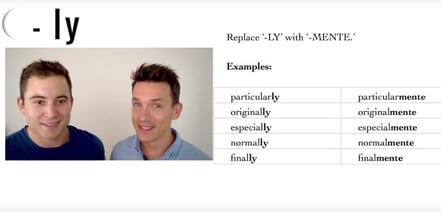
This guide will focus on how to learn European Portuguese fast! Did you know that each Portuguese verb can have over 50 different forms? 😱 With so many different tenses and moods to account for, not to mention learning both regular and irregular verbs, it can feel like a never-ending task. Luckily, to communicate comfortably as a Portuguese beginner, you can get by studying a much smaller subset of conjugations for only the most commonly used forms.
The best way to save yourself time (and sanity!) is to learn the patterns and shortcuts for European Portuguese.
As mentioned in the Portugal News, we put together this “cheat sheet” to show you how to learn European Portuguese fast and get the maximum communicative power out of what you know. Building this foundation gets you talking in basic conversations earlier, which means you’ll pick up additional skills more naturally over time.
Shortcuts Using the Present Tense
Start by learning the presente do indicativopresent tense verb endings for regular -ar, -er, and -ir verbs, as well as for the most common irregular verbs. Here are a few suggestions for which verbs to study first:
- serto be(permanent) estarto be(temporary) irto go
- terto have poderto be able to (can, may) gostarto like
- falarto speak comerto eat
As for the rest of the verbs, try to learn some of the infinitive forms, but don’t worry about the conjugations just yet. You can use this first set of verbs to talk about a wide variety of actions and can even refer to the present, past, or future, if you get a little creative. Now let’s see how we can maximize our knowledge of the present tense in the following shortcuts.
Use “estar + a + infinitivo” for the Present Continuous Tense
 The present continuous tense is a bit simpler in European Portuguese compared to Brazilian Portuguese, because it utilizes the pattern verb estar + a + verb in the infinitive, instead of using the gerund form of the verb. This means you only have to conjugate estar when you want to talk about an ongoing action that is happening at the moment. For example:
The present continuous tense is a bit simpler in European Portuguese compared to Brazilian Portuguese, because it utilizes the pattern verb estar + a + verb in the infinitive, instead of using the gerund form of the verb. This means you only have to conjugate estar when you want to talk about an ongoing action that is happening at the moment. For example:
Avoiding the Present Perfect Continuous
Similarly, you can use verb andar + a + infinitive when you want to talk about something that you have been doing. This is strictly informal, but it’s a good way to avoid the present perfect continuous tense, which is more advanced.
Ando a comer melhorI've been eating better Ando a aprender portuguêsI've been learning PortugueseAlternatively, you can use the word há (from the verb haver) with the present tense to talk about something you have been doing for a certain period of time. For example:
Há 2 anos que escrevoI've been writing for 2 years Moro aqui há três mesesI've been living here for 3 monthsAvoiding the Future Tense
 There are also European Portuguese shortcuts that let you use the present tense to talk about the future. Here we go avoiding things again! It’s okay, because our focus right now is on how to learn European Portuguese fast. In other words, we want to quickly develop a basis for the language that we can use to get talking early and then build upon over time.
There are also European Portuguese shortcuts that let you use the present tense to talk about the future. Here we go avoiding things again! It’s okay, because our focus right now is on how to learn European Portuguese fast. In other words, we want to quickly develop a basis for the language that we can use to get talking early and then build upon over time.
In fact, sometimes the shortcuts are actually more common to hear, especially in spoken language. The actual future tense, also known as futuro do indicativo , is typically only used in more formal or literary contexts. In everyday conversations, it’s much more common (and much easier!) to use one of the following options:
ir + infinitivo
Guess what? To talk about the future, you only have to know how to conjugate one verb in the present tense: irto go .
Indicativo
Once you have that memorized, you can just add the infinitive form of another verb onto the end to say that you are going to do something. This is known as the informal future tense:
Vou comerI am going to eat Vais chegar em breve?Are you going to arrive soon? Ela vai morar láShe is going to live there Vamos correrWe are going to runNote: There is not an “a” before the infinitive verb like there was with the last shortcut (and like there is in Spanish)!
Present tense + context
Sometimes, you can simply use the present tense to imply a future action (I do → I’ll do), but only if it’s clear from the context that you are referencing the future.
For example, if you add single words such as amanhãtomorrow or depoisafter, later , or groups of words mentioning dates or times of day, the listener will know you are talking about the future, not the present.
Depois passo cáI'll stop by later Faço anos na próxima semanaMy birthday's next week Provamos o bolo depois de jantarWe'll taste the cake after dinnerEven without these references to dates and times, sometimes the context makes it abundantly clear. For example:
Se ela gostar, eu trago os outros doisIf she likes (it) , I'll bring the other twoWe’re mentioning something that may or may not happen, so you know we’re referencing a time in the future with eu trago.
Or, take this short dialogue, for example:
👩🏾🦱 Cláudia: Diz-lhe que lhe mando um beijinho.Tell her I send her a kiss.
👩🏾🦱 Cláudia: Tenho tantas saudades dela!I miss her so much!
🧔🏻 Tiago: Digo, simYes, I'll tell (her) .
Cláudia and Tiago are clearly talking about someone who is not there right now, so it is implied that Tiago will pass along Cláudia’s message later (in the future).
Avoiding the Past Tense
 It’s a good idea to learn the pretérito perfeitosimple past tense , including the common irregular verbs and the regular endings for -ar verbs, -er verbs, and -ir verbs.
It’s a good idea to learn the pretérito perfeitosimple past tense , including the common irregular verbs and the regular endings for -ar verbs, -er verbs, and -ir verbs.
However, we know you want to know how to learn European Portuguese fast! There’s three common ways you can get around learning all of those endings right away and those are the following formulas: verb estar + a + infinitivo, verb acabar + de + infinitivo and verb ir + infinitivo. This way, you only need to know the pretérito perfeito tense of the verbs estarbe , acabarfinish and irgo . Let’s go through each one now.
acabar de + infinitivo
Now you can say:
Acabámos de chegarWe just arrived Acabei de comerI just finished eatingYou can also, sometimes, add more context to the sentence which allows you to refer to something you did earlier rather than just now:
Acabei de jantar tardeI finished eating dinner late Acabaste de ler o livro ontem?Did you finish reading the book yesterday?estar a + infinitive
Indicativo
- eu estiveI wasindicativo > pret. perfeito tu estivesteYou sing.,inf. wereindicativo > pret. perfeito ele / ela esteveHe / She wasindicativo > pret. perfeito você esteveyou formal wereindicativo > pret. perfeito nós estivemoswe wereindicativo > pret. perfeito eles / elas estiveramthey wereindicativo > pret. perfeito vocês estiveramyou pl. wereindicativo > pret. perfeito
While the previous way (“acabar de”) usually indicates actions that just took place, “estar a” is used with actions that happened and ended a while ago, whether that is one hour ago or yesterday. Let’s see some examples:
Estive a fazer o almoçoI made lunch instead of Fiz o almoço
Eles estiveram a estudar na bibliotecaThey studied at the library instead of Eles estudaram na biblioteca
You can also add more context to these sentences to discuss actions that happened further in the past:
Estiveste a tratar da papelada na semana passadaYou took care of the paperwork last week Ontem estive a limpar a casaYesterday I cleaned the houseir + infinitive
Indicativo
- eu fuiI wentindicativo > pret. perfeito tu fosteYou sing.,inf. wentindicativo > pret. perfeito ele / ela foiHe / She wentindicativo > pret. perfeito você foiyou formal wentindicativo > pret. perfeito nós fomoswe wentindicativo > pret. perfeito eles / elas foramthey wentindicativo > pret. perfeito vocês foramyou pl. wentindicativo > pret. perfeito
This is an alternative to using estar a to reference the past and it means, basically, that “I went and did something”. Notice that unlike acabar and estar, there is no preposition (a or de) before the infinitive.
Fui fazer o almoçoI (went and) made lunch instead of Fiz o almoçoI made lunch
Fui passear o cãoI took the dog for a walk instead of Passeei o cãoI walked the dog
Once again, you can add more context to the sentence to make it clear when the action happened.
Foste fazer as compras ontemYou went shopping yesterday Fomos buscar o cão na terça feira passadaWe went to pick up the dog last TuesdayPresent tense + context
Similar to what happens with the future tense, you can also avoid the past tense by conjugating a verb in the present simple and adding a preposition such as desdesince to reference the past:
Estou solteiro desde ontemI'm single since yesterday, I've been single since yesterdayGetting Creative With What You Know
As you start adding more verbs to your vocabulary, you’re able to get creative with how you phrase things to avoid the verb conjugations you don’t know. For example, let’s see some examples of sentences we can form knowing only how to conjugate querer, poder, and ter:
Tenho de estudarI have to study instead of Devo estudarI must study
Eu posso ajudarI can help instead of Eu ajudareiI will helpindicativo > futuro
Quero ver o filmeI want to watch the movie instead of Gostaria de ver o filmeI would like to watch the movie
Vocabulary Shortcuts
 Cognates
Cognates
If you want to learn European Portuguese fast, you can add a lot of vocabulary quickly by focusing on cognates. Cognates are words that have a common origin, which means they are often very similar to the English translation. You can learn more in this video Joel and Rui put together on 5000 Portuguese words you already know!
Let’s take a look at some of the common spelling patterns when going from English → Portuguese. Keep in mind that these don’t apply every time; they are just a way to help you keep an eye out for other cognates:
ph → f
o telefonetelephone a farmáciapharmacy alfabetoalphabet
th → t
o teatrotheatre a atletaathlete matemáticomathematics
tion → cão
ficçãofiction opçãooption situaçãosituation
ty → dade
sociedadesociety responsabilidaderesponsibility comunidadecommunity
ism → ismo
racismoracism turismotourism organismoorganism
ist → ista
artistaartist ortodontistaorthodontist optimistaoptimist
ize → izar
organizarorganize autorizarauthorize especializarspecialize
ous → oso / osa
nervosonervous(masc.) curiosacurious(fem.) famosafamous(fem.)
Loan words from English
Good news, there are a number of words that you don’t have to worry about translating! With English being so widespread, there are many words that have come to be used in Portuguese as well. You’ll notice that many of them related to technology and popular culture. Sometimes the spelling stays the same as the English version, but other times it changes to match the way it’s pronounced in Portugal.
- shopping
- fast food
- check-in
- stress
- bestseller
- laptop
- sitesite, website
- designer
- internet
- marketing
- uauwow
- uísquewhiskey
- pijamapajamas
- panquecapancake
- champôshampoo
What Else?
Do you know any other shortcuts that have helped you learn European Portuguese fast? Share in the comments!




This is great I have a desire to learn Portugese.
Obrigado
This is really great info and look forward to learning more. Thank you
Thanks for this very comprehensive lesson. I have spent the past 5 months learning português on Duolingo which has been good but sounding so different. Thanks to your audio I feel pretty sure now that it’s Brazilian português. Oh no!!!
Glad this was helpful for you! And yes, we hear that a lot. 🙂 The Brazilian pronunciation is quite different, but at least you got a start with Portuguese in general. You might find this guide interesting too: Brazilian Portuguese vs European Portuguese
Thanks for the useful shortcuts! I am preparing to move to Portugal. This will help fast-track my basic working knowledge!
Caros Rui e Joel
Sempre me facilitando a vida, obrigada!!
Mas a última frase “espero QUE te veja (presente do Conjuntivo) sai do contexto e suscita dúvidas…
Embora tivesse algumas pequenas críticas, novamente, principalmente em relação à irrelevância de algumas sugestões, este post é PRECIOSO. Parabéns e obrigada. Um abraço amigos… ( eu sou a Ana… Nos encontrámos na Blip em Portimão…)
Olá Ana, que bom ouvir de si! Eu lembro-me sim da nossa conversa, foi um prazer falar consigo. Que pena que o BLiP não vá acontecer este ano, (pelo menos fisicamente. Vão experimentar um novo formato online). Obrigado por este feedback, vou rever esse exemplo com a nossa equipa. Obrigado de novo, e cumprimentos a si e aos seus alunos.
This is really greatz since the verbs can be the sauces of problems in accelerated learning of any language
Muito útil! Ando a perder o meu sotaque português devido a viver nos EUA. Este site e’ precisamente o que eu preciso para treinar o sotaque e o ouvido!
awesome
We are considering living in Portugal for 1/2 year or full time early next year.
I’ve been learning, but mostly I’m getting translation from Brazilian Portuguese. I need to use your site due to being “true Portuguese”.
How can I sign up to get started?
Glad to hear it! You can sign up here: Become A Member Feel free to reach out if you have any questions. 🙂
Porque “Se ela gostaR, eu trago os outros dois.” e não “Se ela gosta …” ou “Se ela gosta o/a …” Why do you use the infinitive form of gostar rather than conjugate it in the 3rd P sing.? Is this a common practice in Portuguese?
Gosto de atalhos ! Muito obrigada 🙂
Olá! It looks like the infinitive, but it is actually the future subjunctive form of the verb “gostar”. The verb happens to look the same in both cases, but we can differentiate by context (or by replacing it with other verbs that are more easily distinguishable and seeing which of their forms fits best).
The future subjunctive fits well here, since the speaker is referring to a hypothetical future situation.
I am struggling to learn portugese. I am already in portugal for 9 months and going to stay in portugal for lifetime. Can you suggest more resources to learn portugese faster. looking forward to hearing from you soon 😀